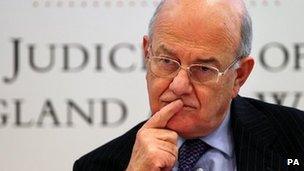Lord Chief Justice urges free vote on murder reform
- Published
- comments

Lord Judge was keen to emphasise that changing the law was a matter for Parliament
The Lord Chief Justice has said he would like a free vote in Parliament on the reform of murder laws.
The comments from the most senior judge in England and Wales came after a panel of legal experts said the current law treated mercy killers on the same basis as serial killers.
But David Cameron's official spokesman said the prime minister did not believe mandatory life sentences were outdated.
Lord Judge also said he had discussed the abuse of parliamentary privilege.
He said he had met the Commons speaker, John Bercow, and was asked about MPs and peers mentioning in Parliament matters which were covered by legal orders, such as John Hemming naming footballer Ryan Giggs despite a super-injunction protecting his private life.
Individual crimes
A Downing Street spokesman said: "We have no plans to abolish the mandatory life sentence for murder. The prime minister has always been very clear that serious complaints require serious punishments."
The Homicide Review Advisory Group, made up of judges, academics and former QCs, said the system did not work.
The group said the system did not allow for sentences to match individual crimes.
The mandatory life sentence replaced the death penalty in 1965.
'Fiendishly difficult'
Lord Judge said piecemeal reform did not work and it was important the law was in step with public opinion.
He said careful reform of the "fiendishly difficult" murder laws could improve public confidence without the need to scrap mandatory life sentences.
He said the Law Commission produced a "provocative but very interesting" review five years ago, but the Labour government failed to act on it.
Lord Judge said: "It seems to me, perhaps the real problem is with the law of murder itself.
"It's particularly difficult and troublesome when more than one person is said to be involved, a joint enterprise murder.
"Who is guilty of murder when four people, three people, surround somebody? The one who kicks, the one who suddenly produces the knife - the offensive weapon that causes the death - the one who eggs on the one who's got the knife, the one who says to him, 'For God's sake...'?" he added.
He said: "It's complicated too by the various defences. These are all extremely complicated when they're put together in the one case."
Shadow justice secretary Sadiq Khan said: "Murder is the most serious crime on the book and it's right that it carries the most serious penalty.
"There is a long-established belief that if you take someone's life you should face a life sentence. The public have not moved from this position."
Earlier the Homicide Review Advisory Group said a so-called mercy killing attracted the same mandatory life penalty as serial killings and it said it wanted sentencing for murder to be discretionary.
Its report builds on research published last year which claimed the public may support reforming the penalty for murder to make life imprisonment the maximum sentence rather than mandatory.
'Compromise'
The report claims that "with appropriate education" the public could develop "in the general direction long-favoured by legal experts and the judiciary".

Mandatory life sentences for murder replaced the death penalty in 1965
But Peter Neyroud, a former chief constable and a former member of the sentencing guidelines council, said: "The public were very confused about murder sentencing and in fact regularly thought that the sentences for murder were too lenient, so I'm not sure that you can then leap to the conclusion that they're then ready for what would be quite a dramatic... and I suspect viewed as a reduction in seriousness."
The Homicide Review Advisory Group claim the mandatory life sentence was a compromise arrived at to ensure the abolition of the death penalty made its way through both Houses of Parliament.
Justice Secretary Ken Clarke recently announced plans to extend mandatory life sentences, external for many other crimes as part of a plan to abolish indeterminate sentences.
During his annual press briefing Lord Judge discussed several areas of the law:
He said he had discussed with the Speaker several instances of MPs and peers using parliamentary privilege to break legal orders but denied he was "interfering" in parliamentary affairs.
He said he "personally" had no problem with allowing television cameras into the sentencing phase of criminal trials but said it would require an Act of Parliament.
He spoke out against jurors searching for information on the internet and said they should "honour the oath" they had sworn.
He said he would be issuing guidance before Christmas on the use of Twitter in court.
- Published29 October 2010
- Published8 September 2010